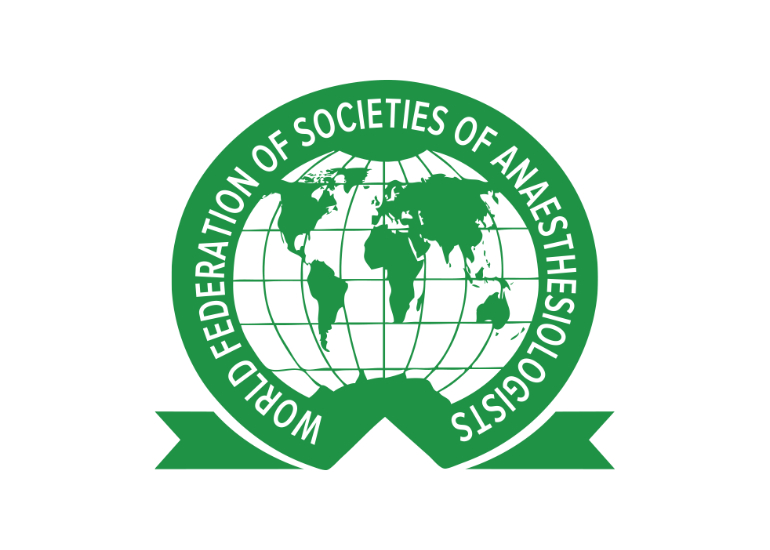A delegation from the WFSA attended the 72nd World Health Assembly (WHA) which took place in Geneva from the 20th – 28th May 2019. The WFSA delegation comprised of Dr Jannicke Mellin-Olsen (President), Professor Adrian Gelb (Secretary), Dr Wayne Morriss (Director of Programmes), Dr Mauricio Vasco (Chair, WFSA’s Obstetrics Committee), Julian Gore-Booth (Chief Executive Officer), and Annabel Higgins (Advocacy and Communications Officer). This busy week is the WFSA main advocacy opportunity every year, and an opportunity as a non-State actor in official relations with the WHO to present statements, meet with WHO officials, country representatives and NGOs to promote safe anaesthesia.
This year’s WHA opened with a speech from The Lancet Editor-in-Chief, Dr Richard Horton, who suggested 5 recommendations to the Assembly, including to “invest in safe surgery and anaesthesia” citing that 5 billion people remain without access to this. This theme was prominent throughout the Assembly, as the WFSA advocated for safe anaesthesia and surgery as a core component of Universal Health Coverage (UHC), including in the WFSA’s statements to the Assembly which we presented in our capacity as a non-State Actor in official relations with the WHO. Our statements were an opportunity to demonstrate how anaesthesia relates to many WHO areas of work, such as noncommunicable diseases (NCDs), patient safety, access to medicines and vaccines, and human resources for health.
On the first official day of the WHA, the WFSA co-hosted an event at the International Committee of the Red Cross (ICRC), along with the ICRC, the G4 Alliance, Safeguarding Health in Conflict Coalition, IntraHealth, and Lifebox. The event, ‘Surgery and Anaesthesia: conflict, poverty and development’, had 150 attendees and a wide variety of speakers, including country representatives, discussing safe anaesthesia in challenging contexts.
The first session of the event features country and regional representatives discussing National Surgical Obstetric and Anaesthesia Plans (NSOAPs) and the provision of safe anaesthesia in their countries.
Left to right, Dr Zainab Chaula, Tanzanian Permanent Secretary; Mr Ben Nangombe, Executive Director, Namibian Ministry of Health and Technical Chair, SADC; Tanzanian representative; Dr Chuong, Vice Director General of the Vietnamese Ministry of Health; Professor Sekelani Banda, Director of Training, Zambian Ministry of Health; Professor Emmanuel Makasa, Director, Wits Centre of Surgical Care for Primary Health & Sustainable Development.
Dr Esperanza Martinez, Head of Health, ICRC, and Dr Ian Norton, Project Lead, Emergency Medical Teams, WHO, present during the second session of the event
The WFSA met with a number of country representatives from Tanzania, Mozambique, Malawi and Myanmar, as well as Fiji, Vietnam and Palau, to discuss the challenges of providing safe anaesthesia and surgery in their countries, and how we can work with them and our Member Societies to help. This was a notable change to previous years, and is possibly a sign of that safe anaesthesia and safe surgery is becoming more recognised amongst member states.
In addition to these meetings with country representatives, the WFSA met with key WHO decision-makers to discuss the availability of vaccines and medicines, patient safety, nursing, infection prevention and trauma care.
Members of the WFSA delegation meet the WHO’s Dr Teri Reynolds at the Palais des Nations to discuss NCDs.
Alongside speakers from the WHO and former Lancet Commissioners, Professor Adrian Gelb presented on the topic of anaesthesia and the WHO-WFSA International Standards for a Safe Practice of Anesthesia at the WHO’s Technical Meeting on scaling up surgical, obstetric and anaesthesia care to strengthen health systems. The WFSA is proud to be the only NGO to be mentioned in the Progress Report from the WHO Director-General, Dr Tedros, ‘Implementation of the 2030 Agenda for Sustainable Development’ by virtue of the WHO-WFSA International Standards for a Safe Practice of Anesthesia.
There have been many positive outcomes from the 72nd WHA, such as the establishment of an annual World Patient Safety Day, to a resolution on emergency and trauma care (WHA Resolution 72.16) which you can read here. For the WFSA, this was an opportunity to build relationships and develop new partnerships to raise the profile of safe anaesthesia within the WHO.






